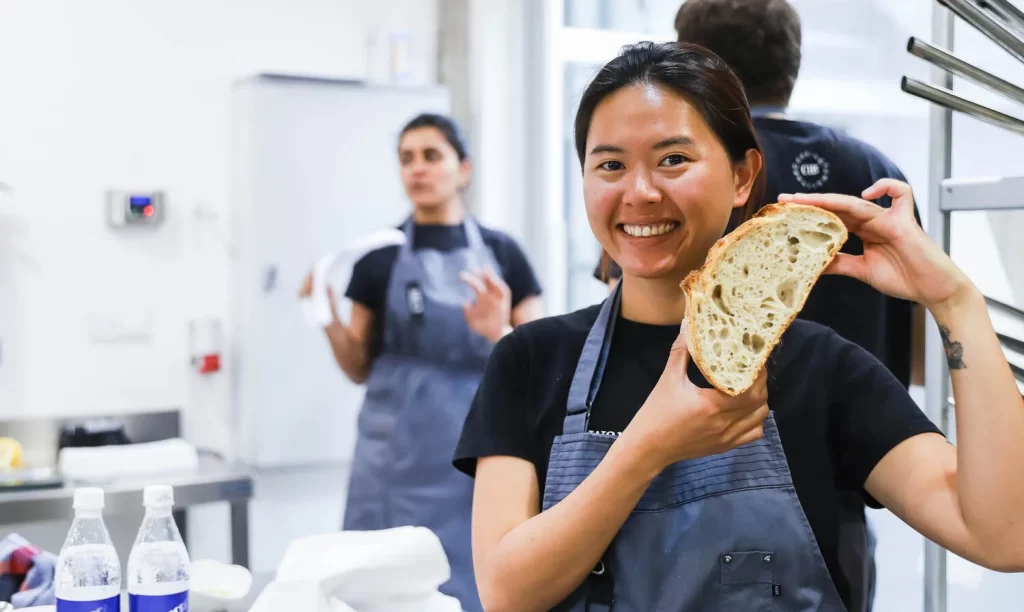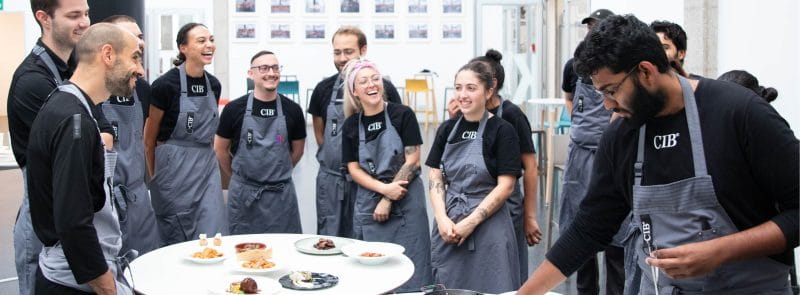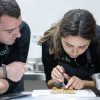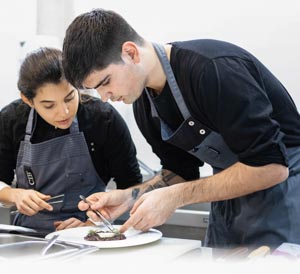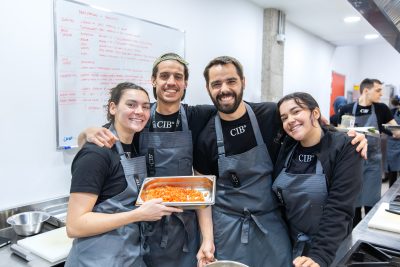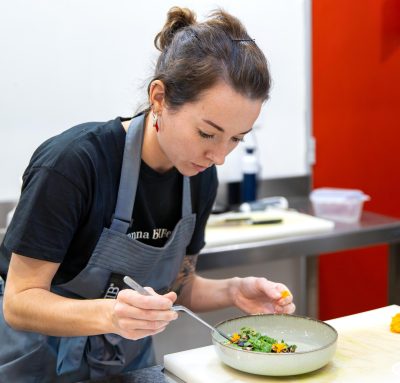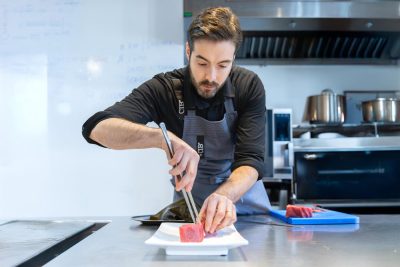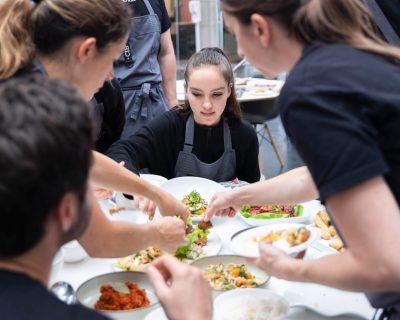In recent years, the kitchen has been a welcoming place for a wide variety of people. There are many reasons why someone decides at a given moment to dedicate himself to gastronomy, but also many profiles from which people access to work or start a business in the sector.
Among them, one of the most common profiles is the one of people who have been working in other professional sectors, sometimes for a long time, and have decided to take a lateral step to dedicate their professional life to what they are most passionate about. They feel the urge to make a change in their life to become a chef or start a business in gastronomy.
Big changes always generate a lot of doubts and some fear, especially when you have a family and a structured life. We have talked to students of the Gran Chef Diploma career who have made one of the bravest decisions of their lives in changing their professional career to become a chef and we have compiled the doubts and answers to this decision. If you are thinking of changing careers to become a professional chef, you may find this information useful.
1. Is it too late to change careers?
Many people worry that it is too late to start over and the truth is that the first sensation is that of a leap into the void. You lose the stability you had until then for a while and for a moment the future is uncertain, open to many possibilities.
Even so, all the students we have spoken to who were in this situation agree that the training experience passes very quickly and you soon find yourself back in the labor market or undertaking your own project. Although there is an age difference between the students, this does not prevent them from understanding and learning from each other.
The students of the CIB · Culinary Institute of Barcelona share this adventurous spirit for taking risks and facing changes with courage and soon create bonds among themselves, help each other and form a small CIB family during the course and also after it, creating a networking network between students and teachers from many parts of the planet that is very useful for their future professionals.
If you really feel that you need a change, you will easily adapt to it, because you will do what you really want to do and you will really be where you want to be. Facing change often means challenging yourself, overcoming fears that you have been carrying around for a long time and seeing that everything is less difficult than that fearful idea that you had internalized.
Natalia Martínez, who worked in marketing, decided to come to CIB to study gastronomy.
2. Is it worth changing careers to become a chef?
Changing careers is a major life change, but no one takes it for granted. Many decide to change because they are bored in their jobs, don’t like them enough or are stuck in them. Others find their jobs too hard and absorbing and need to take a different path.
While it is true that cooking is sometimes hard and that schedules sometimes make it difficult to reconcile family life, gastronomy is a profession that allows you to travel, that allows you to constantly reinvent yourself and that allows you to disconnect when you are not working.
In the era of hyperconnectivity in which you always have to be available and it is so hard to disconnect, a profession like cooking in which you rarely take work home or worries that haunt you in your time off is a privilege. You will have your free time to do whatever you want and that is something that is not easy to achieve.
Many of the students we have interviewed value very positively the fact that they can take advantage of their free time to visit other restaurants, meet friends or family, take short trips to other places or cities or continue training in cooking, something they could not do so regularly in their old jobs.
“When I started my stage I discovered free time. I had never had any real free time, I always had to be on the phone and I couldn’t go out to eat or take a quiet nap.” Agustina Conte, political journalist who decided to study at the CIB
3. What I learned in my previous career will be useful for this one?
Being afraid of having wasted time is reasonable. To think that you have invested a lot of time, effort and money in a profession for a long time that you are now going to abandon, but it does not have to be wasted time.
Although much of the knowledge you needed for your old job will no longer be useful to you now, during your previous work or educational experience you have developed a set of skills and attitudes that you did not have when you started or that those for whom cooking is their first profession do not have.
The ability to work in a team, to be demanding with yourself, to know how to communicate or to know how to work autonomously are useful skills for any profession and only your former profession could give you the resources you have now and that make you who you are.
The skills you learn during your professional development are part of you. An architect or an engineer has an analytical and organizational look that accompanies him in everything he does and a journalist usually has a point of curiosity and ability to express himself publicly.
All these skills or transversal competencies will also be useful in the kitchen; any activity in which you are involved leaves a positive learning trail. In turn, studying gastronomy will train you in other skills and attitudes that will also accompany you if you decide to focus your life on another profession in the future.
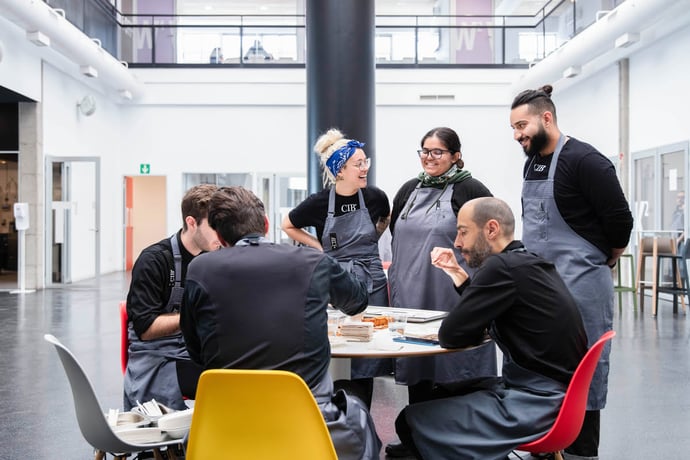
Matthew Kayes, Engineer Manager at Microsoft, changed careers to become a chef at age 60.
4. Will I fit the profile of students interested in becoming a chef?
Cooking is a sector in which it is not excessively complex to enter. It only takes a few weeks or months to learn the main techniques and products, and although you will probably have more experienced colleagues in the kitchen than you, it will be easy to catch up with them if you try hard enough.
One of the advantages of cooking is that you can practice at home and the CIB facilities are also open for students to practice in them and take advantage of the benefits of cooking in a professional kitchen. 32% of CIB students come from other professional sectors and more than half of them intend to start their own business related to the restaurant industry.
The stage, the internship in a restaurant, helps students to catch up and accelerate their learning more easily, thus preparing them for the challenges they decide to undertake in their professional future.
What is most common in CIB students is the desire to challenge themselves, to experiment with the product and techniques by being creative and looking to innovate, to do what no one has done before by applying the knowledge learned to a variety of different projects. There is no age for those who are eager to learn again.
<< Discover how we develop creativity and innovation at the CIB >>
Here you always learn something new, if I miss a day here I lose a lot, I can’t miss it. This is very good, I look forward to going to classes, to learn, I know that there will always be something new that will surprise me”. Priscila Almeida, architect who decided to study cooking at the CIB
5. Will I be able to adapt to a professional kitchen?
When students who have changed careers begin their internship experience on stage, which is often their first professional experience, they may be afraid that they will not be able to keep up with the pace of the work or that the work will become too repetitive or tiresome. Already in the first few days, many find that the time passes very quickly and that they have no difficulty adapting to their colleagues and the demands of the establishment.
At CIB we choose the most suitable restaurants for the profile of each student and we ensure that each student has the internship experience they were looking for, whether they are looking for a small and cozy restaurant where they can have a pleasant and close experience, or a restaurant of the highest gastronomic level to test themselves or aspire to a good working position.
The most important thing is to be prepared to work in a team and be able to anticipate the needs that may arise in the performance of your job, this way you will never be without anything to do and you will never be behind in the tasks you have been assigned.
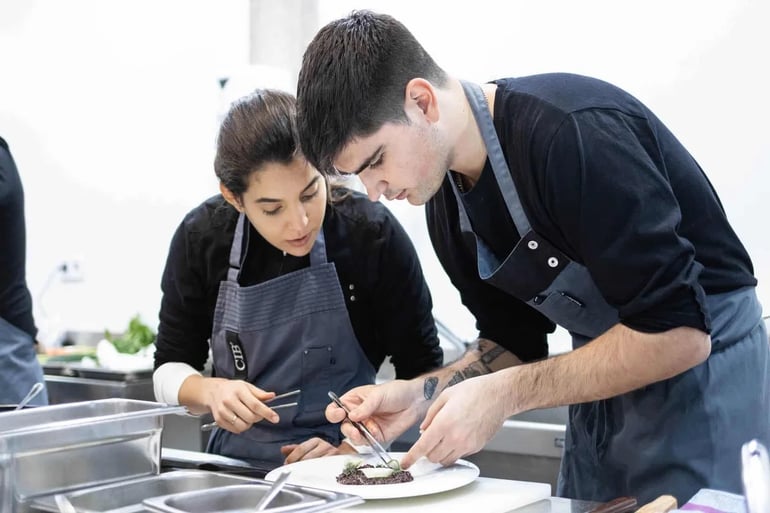
In summary if you are thinking of changing careers to study to become a chef these are some of the things you should keep in mind:
- It’s never too late to change careers, you’ll make the new job your own sooner than you think.
- The age difference does not prevent students from learning from each other and creating bonds that last even after finishing their studies.
- It’s natural to have doubts, if the kitchen is your place, you will end up adapting to it.
- Although the beginnings can be hard, it pays to have work advantages that you didn’t have in your previous job, that’s why you wanted to change.
- You are not starting from scratch, the skills you have learned so far will continue to accompany you and the new ones you learn will also make you be better prepared for the future.
- You need only a few months to pick up the pace of work and the skills necessary to catch up with cooks already working in a professional environment.
- Although they can be intense, the work hours will pass quickly because you will be motivated to work and rarely take work home with you.
- Although they can be intense, the work hours will pass quickly because you will be motivated to work and rarely take work home with you.
- Being a cook allows you to travel, because it allows you to be ready and able to work in any kitchen in the world.

